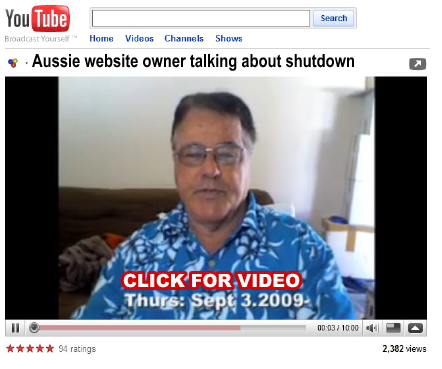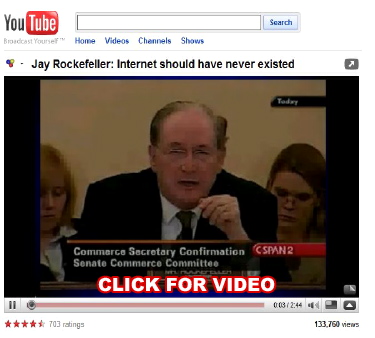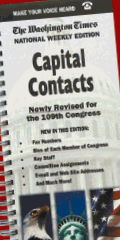
News
Behind the Headlines
Two-Cents Worth
Video of the Week
News Blurbs
Articles
Testimony
Bible Questions
Internet Articles
(2009)
Internet Articles (2008)
Internet Articles (2007)
Internet Articles (2006)
Internet Articles (2005)
Internet Articles (2004)
Internet Articles (2003)
Internet Articles (2002)
Internet Articles (2001)

Australia tests 24-hour takeover of Aussieland ISPs
as Democrats try to regulate the Internet at home
On June 3, 2009, one day before the 20th Anniversary of the Tiananmen Square Massacre in Beijing, the Chinese government censored its own people by blocking their access to the Internet. In addition to blocking the ability of Chinese people to access the Internet, international sites like Blogger, Flickr, and Twitter were placed behind the Great Firewall of China, as were Wordpress and Hotmail. The Australian Parliament was the first official government body to condemn the actions of the Chinese. Green Party Senator Scott Ludlam of the Austrian Parliament criticized China, noting that the "...newly blocked sites now join the existing ban on YouTube and Wikipedia, among a growing list that is thought to include over 6,000 online university websites." The timing of this move is no coincidence.
On June 4, 1989, the Chinese
government implemented lethal force against students peacefully protesting
for political reform. It is thought that thousands of unarmed students
were killed in the melee, which remains a taboo topic within China.
"It's clear," he concluded, "that the Chinese authorities
want to quash any chance of its citizens discussing the historic event,
for fear of similar reprisals.
 Many of China's younger generations are largely unaware of
what happened in Tiananmen Square on that fateful day, due to decades
of government-controlled education, media and historical records. Governments
worldwide simply don't seem to understand the nature of free-flowing information
on the Internet, with several undertaking various forms of government-controlled
filtering programs."
Many of China's younger generations are largely unaware of
what happened in Tiananmen Square on that fateful day, due to decades
of government-controlled education, media and historical records. Governments
worldwide simply don't seem to understand the nature of free-flowing information
on the Internet, with several undertaking various forms of government-controlled
filtering programs."
Ludham concluded that he would urge "...Foreign Minister Stephen Smith to stand up and make Australia's opposition to this very clear on the international stage." One wonders Ludham's reaction when the Australian Labor Party tried to implement a policy which would allow the government to initiate an Internet filtering system that would impact all Australians. The Labor Party did not have the votes in the Senate to enact the legislation last summer. Even though the program was theoretically scuttled, a whistleblower leaked information to WikiLeaks that the Australian Communications and Media Authority [ACMA], the Internet regulatory authority, had constructed a website blacklist. The blacklist would deal with "illegal" or "prohibited" content as defined by the ACMA
On March 18, 2009 WikiLeaks published a list of 2,300 websites which were on the Labor Party's hit list. The Australian government replied, on March 19 that since the ACMA list contained only 1,370 websites, this was not their list. In point of fact, it now appears that there are about 9,000 websites that are being targeted by the Labor Party. Two websites that are on the ACMA blacklist were made public. Both are political content websites that do not, nor never have, posted sexual content of any type. Nor do either display or advocate violence. They are simply political websites like any of those read daily in this country.
One was a pro-life, anti-abortion website. The other contained political content. Most of the content dealt with efforts by government to restrict freedom of speech through State filtration devices that censor content. While the Labor Party insisted they are not violating free speech rights of Australians, civil libertarians insist that the two websites which were censored proves that the Australian government will censor political content. The ACMA admitted they had blocked some political content, but they would admit to doing so only on sites that originated from other countries.
The main problem with Internet free speech in Australia is that almost every Aussie depends on one ISP—the State-owned Telstra for Internet service. Add to that problem politicians who think they have a moral obligation to censor free speech in order to protect the people from immorality. The Australian Family First Party advocates on behalf of installing filters that censor all forms of porn—or violence—nationwide. Or the Labor Party, which believes it has a right to censor political dissent websites if it appears they advocate the overthrow of the government, or any form of domestic terrorism. As you ponder what you just read, it's important to remember that Resident Barack Ohama called the Healthcare Town Hall protesters domestic terrorists. Thus, you and I and every other freedom-loving American who does not want socialized medicine is, in the eye of the Obama government, a terrorist.
On Sept. 3, 2009 the Sydney Morning Herald reported that for a period of one hour, from 7:50 to 8:50 a.m. the State-owned Telstra's international Internet network went down. A Telstra executive, Craig Middleton, told Sky News that customers could not access any international sites of Australian sites containing international links. Since almost every Australian ISP is tied to Telstra, almost every home and business broadband and mobile Internet receiver in the country was affected. Telstra, like England's Telecom, also controls all fixed-line (dial-up) telephone networks in the land down under, as well as one of two cable TV networks. In reality, Telstra is the Great Rabbit-proof Fence down under. This means if Telstra wants to close the gateway to the information super highway in Australia, they can simply pull the plug at whim, and shut down the Internet.
 To
the media, Telstra called it the problem an outage. The company
said they had formed a major incident response team to investigate the
outage, claiming they had no idea what caused it. However, the nature
of the outage raises questions that Telstra has failed to address. The
media, on Sept. 3 failed to mention the fact that a day earlier, Google
went down for a period of one hour. Middleton told Sky News that they
found the problem to be the ISP's international gateway. People simply
couldn't access sites that contained international links.
To
the media, Telstra called it the problem an outage. The company
said they had formed a major incident response team to investigate the
outage, claiming they had no idea what caused it. However, the nature
of the outage raises questions that Telstra has failed to address. The
media, on Sept. 3 failed to mention the fact that a day earlier, Google
went down for a period of one hour. Middleton told Sky News that they
found the problem to be the ISP's international gateway. People simply
couldn't access sites that contained international links.
Middleton would have the Australian people—and those reading stories about the shutdown worldwide—believe that local, homegrown political websites on ISPs tied to Telstra, using hyperlinks to websites in the United States, Canada, England or elsewhere would be shutdown solely based on the fact that there were international hyperlinks in articles on those websites. You would have to be wearing an aluminum foil stupid cap to believe that. If an international portal was down, the local websites would still open, but the hyperlinks would not work. Furthermore, the Aussie website owner who posted this YouTube video (upper right) said, early that day, if Telstra claims the outages were caused by a technical problem, it would be "...an outright lie. We know that there was not a technical glitch, and there was no technical reason why the lines were down, or the web was down, because we rang up—by phone—many places overseas and our websites were all visible overseas. That's point one. Our ISP and service provider [was not] down. They will tell you that your ISP was down with technical problems, but that will be a lie."
The webcaster said he knew Telstra was lying because they checked all of the government's websites, and they were all up and running. Clearly, every government in the world that uses a website for whatever purpose, uses a government secured ISP that it simply won't crash when common usage glitches cause universal outages. And, of course, it will also be immune from intentional glitches designed to test the ability of government interrupt service in a national emergency. In other words, the government can close down the commercial and private sectors without impacting service to the public sector.
What makes the Aussie outage interesting is that the Australian Labor Party, which is the party in power in that country, has already attempted to enact legislation to control the Internet. In April, 2009 Sen. Jay Rockefeller introduced the Cybersecurity Act of 2009 (posted Aug. 23, 2009), which appears directly below this article. The Rockefeller bill, which frightens the American people even more than Obama's healthcare plan, has been rewritten and it appears that Rockefeller's Committee on Commerce, Science and Transportation will be prepared to let that bill run the political gauntlet (since the left has enough votes in both Houses of Congress to enact any legislation without needing a single Republican vote.
On April 9 of this year, the German government raided the offices of WikiLeaks.de and transferred control of that Internet domain to the government. The conspiracy website, The Inquirer, reported on Sept. 6, that WikiLeaks was taken over by the German government because it posted what the Inquirer called "Australia's secret Internet censorship list." What WikiLeaks purportedly showed was that, contrary to the rhetoric of the Labor Party, the Family First Party, and the ACMA, far from simply censoring child porn sites, the list of targeted websites included many sites whose only crime was that they opposed policies of the Aussie government.
The French and German governments enacted Internet Piracy laws earlier this year that will allow them to suspend Internet service for any citizen that illegally downloads movies or music. Under the laws, the first two times the citizens illegally download something, or are suspected of illegally downloading something, they will receive an email advising them of that country's "three strike" law on downloading, they will be banned from having Internet service after the third download. The Internet Service Providers Association [ISPA] said they hoped an agreement on self-regulation between the ISPs and the two governments.
In Rwanda, a British web-hosting company shut down the website of the Hutu rebel forces. In Afghanistan, the government of President Hamid Karzai shut down at least five anti-Karsai websites. Last summer, a US company, Secure Computing, sold a SmartFilter system to the Iranian government that now allows the Iranians to control every aspect of the Iranian people's cyber experience, from emails to blogs to website access could be reached and resolve this problem without the need for a punitive law.
Clearly, as the governments of the world get closer to their corporate dream of global government, their peoples increasingly realize just how fleeting is the nature of freedom. The people in the industrialized nations of the world no longer trust their governments, nor do they trust the corporate news media which the world's elites use to spoonfeed propaganda to their "subjects" and to the politicians who theoretically lead them. Increasingly, the media of the common people has become the Internet. And, that's a problem for the taskmasters of Utopia who need the people communicating with one another even less than they need them reporting what is happening in, and to, their nation over the Internet.
Third attempt to create
Cybersecurity
If S.773,
the Cybersecurity Act of 2009 which was proposed by Senators Jay
Rockefeller [D-WV] and Olympia Snowe [R-ME] with cosponsors
Bill Nelson [D-FL] and Evan Bayh [D-IN] on April 1, 2009,
somehow finds enough votes in the House and Senate, Obama will
have the power to create a cadre of regulations that will virtually suspend
the 1st Amendment and silence his political detractors on the Internet.
The legislature will provide the Secretary of Commerce—or Obama's
cyberczar (authorized by this legislation)—who, without congressional
oversight, will be allowed to access any process, program or protocol
from any Internet website, platform, network or operating system without
regard of any provision of law, rule, or policy restricting such access.
The bill, as it's written, risks giving the federal government unprecedented
power by federalizing critical infrastructure security—particularly
within those system used by telecommunications companies and banks that
are in the hands of the private sector, by shifting the power to control
those systems away from those companies which created them, to the federal
government.
Sources for Sen. Rockefeller insist this legislation was not being contemplated to take over the Internet. He compared what Rockefeller is proposing to the type of authority used by the White House on Sept. 11, 2001 to ground all aircraft in the United States. The difference being, planes are flying today. If Obama is granted power to control the on-ramps to the informationa superhighway, it is an authority he will not cede back to the people willingly. The framework for this legislation was constructed with input from the Obama White House. And, that makes the Cybersecurity Act of 2009 very suspect. Rockefeller argued that the legislation is critical to protect national cybersecurity. "We must protect our critical infrastructure at all costs—from our water to our electricity, to banking, traffic lights and electronic health records..." playing to the political concerns of Washington (which always take precedent over human concerns in the minds of the bureaucracy.) Rockefeller's Obama-revised legislation will reshape how the bureaucrats look at cybersecurity. Obama looks at it like a Marxist despot crafting a totalitarian dictatorship. If the Cybersecurity Act of 2009 is enacted, Obama will use S.773 to silence all political opposition.
 Section
18 of S.773 gives Obama the authority, during a declared emergency,
to shutdown all Internet traffic or, on his judgment, limit access to
the Internet to government networks and non-government networks and private
communications groups who are approved by the White House. Obama
is a quick study. He's far less concerned about cyberterrorists sabotaging
Internet technology than he is about patriots using the capabilities of
the Internet as an uncensored alternative to mainstream TV, radio and
print news. If Obama can fabricate the right cyber-crisis, he will
be able to control the on- and off-ramps of the Internet. The opposing
views of the alternate media will be stifled. That means no Internet radio,
video or print media.
Section
18 of S.773 gives Obama the authority, during a declared emergency,
to shutdown all Internet traffic or, on his judgment, limit access to
the Internet to government networks and non-government networks and private
communications groups who are approved by the White House. Obama
is a quick study. He's far less concerned about cyberterrorists sabotaging
Internet technology than he is about patriots using the capabilities of
the Internet as an uncensored alternative to mainstream TV, radio and
print news. If Obama can fabricate the right cyber-crisis, he will
be able to control the on- and off-ramps of the Internet. The opposing
views of the alternate media will be stifled. That means no Internet radio,
video or print media.
In 1952, during the Korean War, the United Steel Workers—political allies of President Harry Truman —went out on strike. The union demanded wage increases that the steel industry could not afford unless they were allowed to increase the price of steel far beyond that which would have theoretically been approved by the FDR-era World War II Wage Stabilization Board. Truman could have used the Taft-Hartley Act to stop the strike, but Truman was allied with the unions, not the steel industry. In 1952 , the AFL-CIO aligned, pro-Communist United Steel Workers were attempting to cripple the ability of US defense contractors to keep the military supplied. Declaring a national emergency (i.e., crisis), Truman issued an executive order and nationalized the steel industry. (Does any of this sound familiar?)
The steel industry fought back. Two months later the US Supreme Court ruled that the Constitution did not grant the President of the United States implied or residual powers to assume broad authority to do whatever he wanted to do as the nation's chief executive. Nor could Congress grant the President powers it did not, itself, possess. What that means is the Obama did not, nor does not, possess the authority to nationalize the auto industry. Nor did he have the authority to fire the CEO of GM. Yet, knowing that Congress cannot delegate authority it does not possess has not stopped Jay Rockefeller and Olympia Snowe with the complicity of Bill Nelson and Evan Bayh from attempting to endow Obama with new "emergency power" over all non-governmental computer programs, protocols, networks, platforms, and operating systems. Under the Cybersecurity Act of 2009, all Obama would be required to do in order to exercise this new executive power is to declare that a crisis exists with any non-governmental computer network and he can either shut them down or temporarily take them over.
How the American people will respond to this latest proposed usurpation of the the Bill of Rights is unclear. It is also unclear to what extent the far left, which controls both Houses of Congress, will go to try to deceive the public into believing that "dark forces" around the world are currently at work trying to launch a global computer attack that could wipe out not only all of the government's computer networks but those systems used by private enterprise. When a malware writer, who was ultimately identified as an amateur cybersociopath, deployed an updated version of MyDoom (a botnet email worm) on July 4, media reports claimed that the US Treasury, Department of Transportation, Department of Homeland Security, the Secret Service, and the Federal Trade Commission websites were struck by a DDOS (a distributed denial of service) botnet. ComputerWorld reported that the botnet did not "...use typical antivirus evasion techniques, and does not appear to have been written by a professional malware writer."
Word spread quickly that a foreign government, either China or Russia, conducted a disabling cyber attack against US computer networks. Chinese hackers are reportedly believed to have carried out several computer network intrusions, most recently accessing the computer system of the Defense Department's Joint Strike Force Fighter program. Prior to that, word leaked that a cyber break-in of the computer system that controls America's electrical power grid had taken place. Suspected terrorists left behind software that could be activated at any time to disrupt electrical power. These events, beginning in the late fall of 2008, ostensibly were the reason for Rockefeller's cybersecurity legislation.
Rockefeller and key Democrats on the (since no Republicans were needed to enact the legislation) participated in a secret meeting with Obama where cyberterrorism and the need for a national cybersecurity plan was discussed at great length. He held a press conference in which he declared that "...cybersecurity, perpetrated through the Internet is the number one national hazard of attack on the homeland. It almost makes you ask the question would it have been better if we hadn't invented the Internet, and had to use paper and pencil...or whatever. And, that's a stupid thing to say, but it has genuine consequences because it's on the Internet that these acts of shutting down...you know, they have the television saying that the Dept. of Defense is [hacked] 3 million times a day. And, it's true. Everyone's [hacked]. Anyone can do it. It's an act that can shut this country down. Shut down its electricity system, its banking system, shot down anything...People say it's China and Russia, but it could be some kid in Latvia doing the same thing...It's an individual act. it doesn't require a sleeper cell. It's an act. It's an act that can shut this country down. Rockefeller, whose uncle David Rockefeller is one of the key architects in the remodeling of the United States into something the Founding Fathers would not recognize, was testing the water to gauge the public's reaction to this new encroachment on the Bill of Rights.
The Tea Party movement, which started in April, was already well under way in May, and the anger of the nation was growing mightily. Rockefeller, who planned to have the Cybersecurity Act of 2009 being voted on before Congress recessed in August, postponed bringing the bill to the floor in July as he initially planned. Thus, the threat to US corporations and the political advoacy groups who utilize the Internet remained in its larval stage. The cocoon still exists because the legislation has not made it out of the Committee on Commerce, Science and Transportation which is chaired by Rockefeller. For that reason, you need to note that on that committee are Democrats Barbara Boxer [CA] (who is already in an uphill fight to keep her seat), Mark Begich [AK], Maria Cantwell [WA], Byron Dorgan [ ND], Daniel Inoye [HI], Mike Johanns [ NE], John Kerry [MA] Amy Klobuchar [MN], Clare McCaskill [MO], Bill Nelson [FL], Mark Pryor [AR], Tom Udall [NM], and Frank Lautenberg [NJ]. Republican members of the committee are: Kay Bailey Hutchinson, ranking GOP member [TX], Sam Brownback [KS], Jim DeMint [SC], John Ensign [NV], John Isakson [GA], Mel Martinez [FL[, David Vitter [LA], John Thune [SD] and Olympia Snowe [ME].
A vote to move the Cybersecurity Act of 2009 out of committee was postponed because of the nation's furor over Obamacare. Had Rockefeller pushed the bill onto the floor for a vote before Congress tried to enact Obamacare, it would have cleared committee on a near party vote, 15 to 8. Olympia Snowe would have voted with the left. It's uncertain if it would have been enacted. What is certain is that it would have triggered the same degree of anger towards Washington that Obamacare generated. It is now very clear that Obama overplayed his hand by attempting to steal a nation before the people woke up. The cock has crowed three times. The people are now awake. And the people are angry. And, because they are, the people are preparing to show Obama and the Far Left the type of change they had in mind prior to the Election of 2008. That change will begin on Election Day, 2010; and it will climax on Election Day, 2012.
Snowe comes up for re-election in 2012. At that time, Republicans in the State of Maine need to send her packing. Snowe casts her vote with the Democrats about 60% of the time. Other Democrats on the Committee on Commerce, Science and Transportation coming up for re-election in Nov., 2010 are Senators Boxer, Dorgan, and Inoye. Regardless what party you belong to, on Election Day, 2010, remember they were part of an Obama White House plot to nationalize the Internet and greatly restrict, if not completely ban, your access to cyberspace. Drastic steps just to rid themselves of their political detractors. Especially the "Birthers."

Copyright © 2009 Jon Christian Ryter.
All rights reserved.





